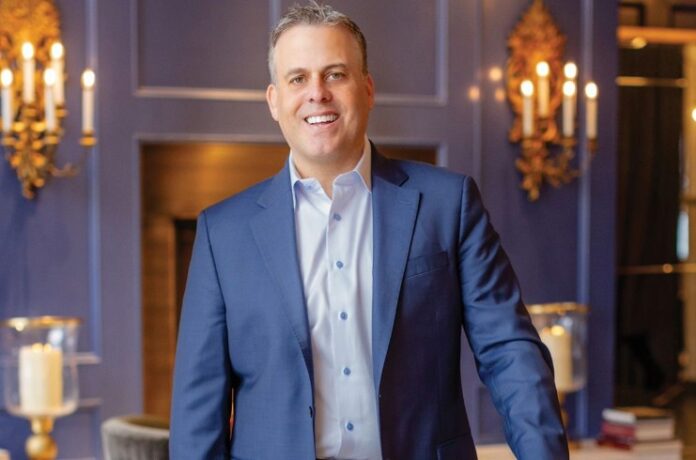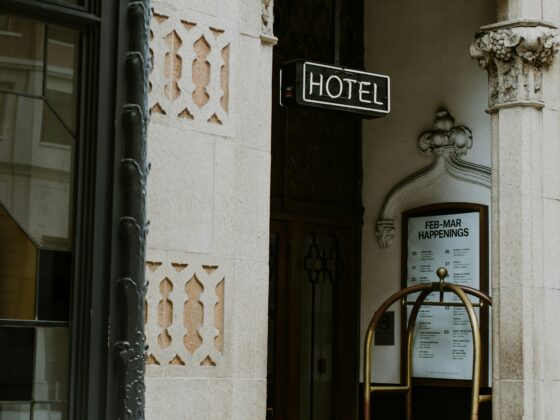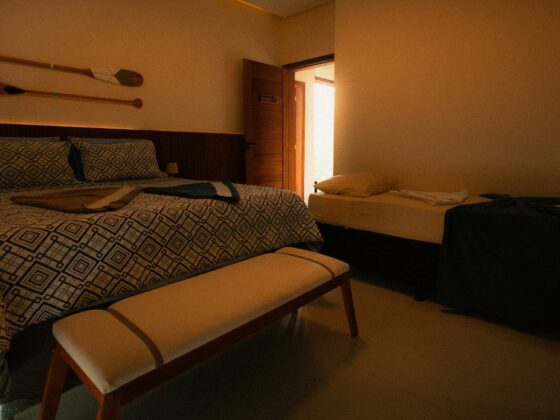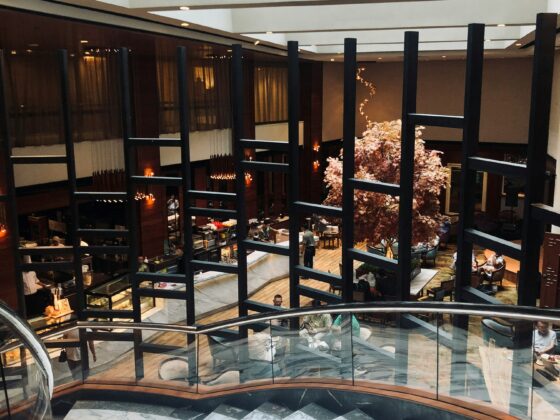
Coury Hospitality President Andrew Casperson recently spoke with LODGING from Bentonville, Arkansas, where he was visiting the AC Hotel Bentonville, a Marriott hotel, set to open in the spring of 2025. In addition to sharing details of his career path and the people who influenced it, he discussed challenges such as attracting team members—called “experience curators” at Coury—that can support the company’s mission to provide exceptional experiences for guests, and how this lifestyle-brand focused management company is now extending its services to more traditional brands through its Concert Hospitality entity.
Early Career
Casperson’s career dates to high school in the mid-’80s, when his first task at a Holiday Inn in Burlington, Massachusetts, involved setting up banquet tables for a baseball card show. He admitted that one perk of the job—discounts on skiing—contributed to his decision to continue working there throughout college, “doing whatever was needed” while pursuing a finance degree. Along the way, he came to enjoy how “every day was different,” so he decided to stick with the industry after graduation, taking a position as an assistant front office manager.
That finance degree came in handy. “I knew how to use spreadsheets and was able to help with forecasting and budgets,” he said. His early experience and proven willingness to do whatever was needed and go wherever needed likely enabled him to “skip over some positions” to become GM of a 100-room hotel outside Boston at only 25 years of age.

Career Moves
With a supportive wife—“she had a job she could do anywhere”—and no kids yet, Casperson left Massachusetts for an opportunity with Wyndham International, working for Dave Johnson, whom he considers a mentor. The opportunity to open and become GM of a busy 260-room hotel at the Newark Airport was likely offered, he joked, “because nobody else wanted it.” His five years with Wyndham included other relocations for increasingly responsible GM positions in Miami and Atlanta.
Next was a move to a new company, W Hotels in Chicago, where he worked with another mentor, Tina Edmundson—now president, luxury, at Marriott International—and was introduced to the lifestyle segment. He remained in that position with W Hotels for three years before he accepted another relocation and professional growth opportunity, to a W Victory in Dallas, Texas. During his time at W Victory, he fell in love with Dallas, where his family of four had developed roots.
So, when he received an offer from Omni Hotels & Resorts—via Johnson and Mike Deitemeyer, who became another mentor—he was thrilled to be able to remain in the area, where he still lives today. At Omni, Casperson gained experience in multi-property management with dual roles as GM, first at Omni Las Colinas Hotel, then at Omni Fort Worth Hotel, while simultaneously supporting other Omni properties as area managing director. “I was with Omni almost 10 years. I ended up being VP of operations, overseeing half their portfolio,” he said.
Easing into the Lifestyle Segment
Reflecting on his migration from Wyndham’s more rigid environment and career trajectory to that of W Hotels and Omni, Casperson said, “The lifestyle hotels changed my entire skillset and view of life—basically from thinking success meant running a 1,000-room hotel and adhering strictly to brand dictates, to having more freedom to be creative, to be open to new trends. Although I still enjoyed the Omni’s upper-tier hotels, the lifestyle hotels were upscale, but they were also authentic.”
He spoke much about “activating every inch”—that is, creating exciting venues and activities to engage guests and the community to help create memorable experiences, including transforming unused storage rooms into hidden speakeasies, F&B with music, handcrafted cocktails, and inventive meals served in a lively atmosphere. “We want to capture the guests, get them out of the guestrooms and downstairs and into our restaurants and bars and public areas.”
Casperson hastened to point out that incorporating such lifestyle elements and maximizing profitability are not mutually exclusive—the lifestyle approach balances owner needs while providing memorable experiences for guests. “The fact is, the lifestyle approach helps drive higher ADRs because people love coming to these hotels. They want to be where there are activations, and they’re willing to pay for it.”
Growing Coury
Casperson, who recently became president of Coury, has a vision for growing this hotel management company rooted in a strategic mindset. He described the growth that has already occurred at Coury since his arrival in 2023: “When I started, we had 11 hotels and about 25 F&B outlets, and we ended 2024 with 22 hotels and 43 outlets.” He said he expects these numbers to nearly double again in 2025.
Part of the strategic mindset, he mentioned, was the decision to create a separate LLC called Concert Hospitality in 2024 specifically to grow the company by accepting contracts to manage some of the more traditional brands—such as Marriott Courtyards, Hilton Garden Inns, and even full-service Marriotts, in addition to the lifestyle-focused properties they’d been handling exclusively.
Explaining the thinking behind this decision, he said, “We realize that a lot of what we do with the lifestyle side—Coury—transfers well to other types of hotels; that is, we could similarly drive revenue with some of those elements of lifestyle properties while adhering to the programmatic standards that define such brands.”
All of which comes back to delivering results to owners on both sides. “We’re betting that we can drive the top line on the Concert side a little more by using some of the approaches we take on the Coury side,” he said.
Attracting and Keeping “Curators”
Casperson called finding the right curators the company’s biggest challenge and maintained that he is personally involved with the conceptualization of training and professional development strategies to ensure consistent quality and service at its distinctive venues. “We believe that curators are coming to work for more than just a paycheck. We spend a lot of time trying to have the right people on board, and spend a lot of time training and developing them. At our company, the training journey can last upward of six months to a year; quite frankly, it actually never stops. Our retention rates are fantastic,” he described.
Emotional Rewards
While Casperson said he finds “designing new hotels and F&B outlets exciting,” he noted that he feels most fulfilled by “making a difference in people’s lives” through the hospitality industry. “With guests, you can help create special memories at events like birthdays and weddings. With curators, you can make an enormous difference in their lives by supporting their professional growth and development,” he explained. “Nothing makes me happier than when I get a text from one of our curators who says, ‘I just got promoted.’”
Mentors Who Mattered
Casperson gives credit to three hospitality leaders
Andrew Casperson, president of Coury Hospitality, made no secret of the part three people in particular played in his career to date. “As I sit here today, I think of those three people—Tina, Dave, and Mike—who taught me different skillsets and introduced me to much of what I do today,” he recalled.
Former Wyndham International President Dave Johnson, he said, advised him early in his career to keep his eye on the top line. “Back when I was first working with him at Wyndham, he said, ‘Focus on driving revenue. You need to deliver to the bottom line, but if you drive that top line, you are going to be successful.’”
President, Luxury at Marriott International Tina Edmundson and former Aimbridge Hospitality CEO and Omni Hotels & Resorts President Mike Deitemeyer, he said, greatly eased his transition into the lifestyle segment through their guidance and embrace of its goals and elements. “Tina really taught me about looking at a hotel through a different lens. She made me really think about paying attention to details and activations, the idea of driving food and beverage, getting people out of their hotel rooms and into their lobby bars and their third-party restaurants.” As for Mike, he “cared so much about food and beverage, luxury, and quality. At Omni, he taught me everything from designing and opening new hotels—some as large as a thousand rooms, some as small as a couple of hundred.”






